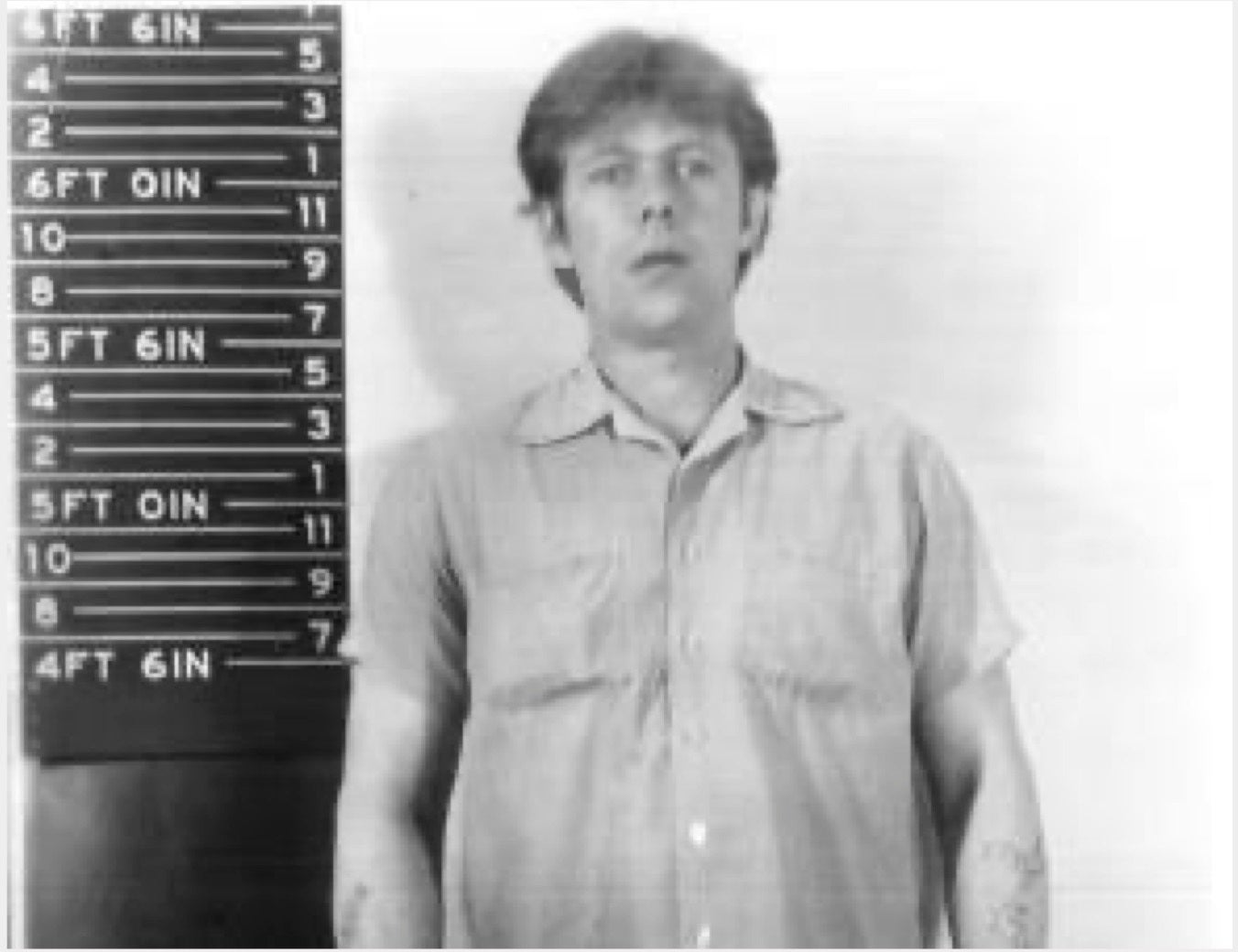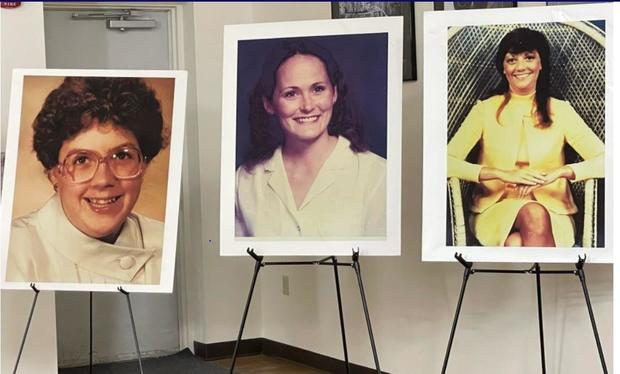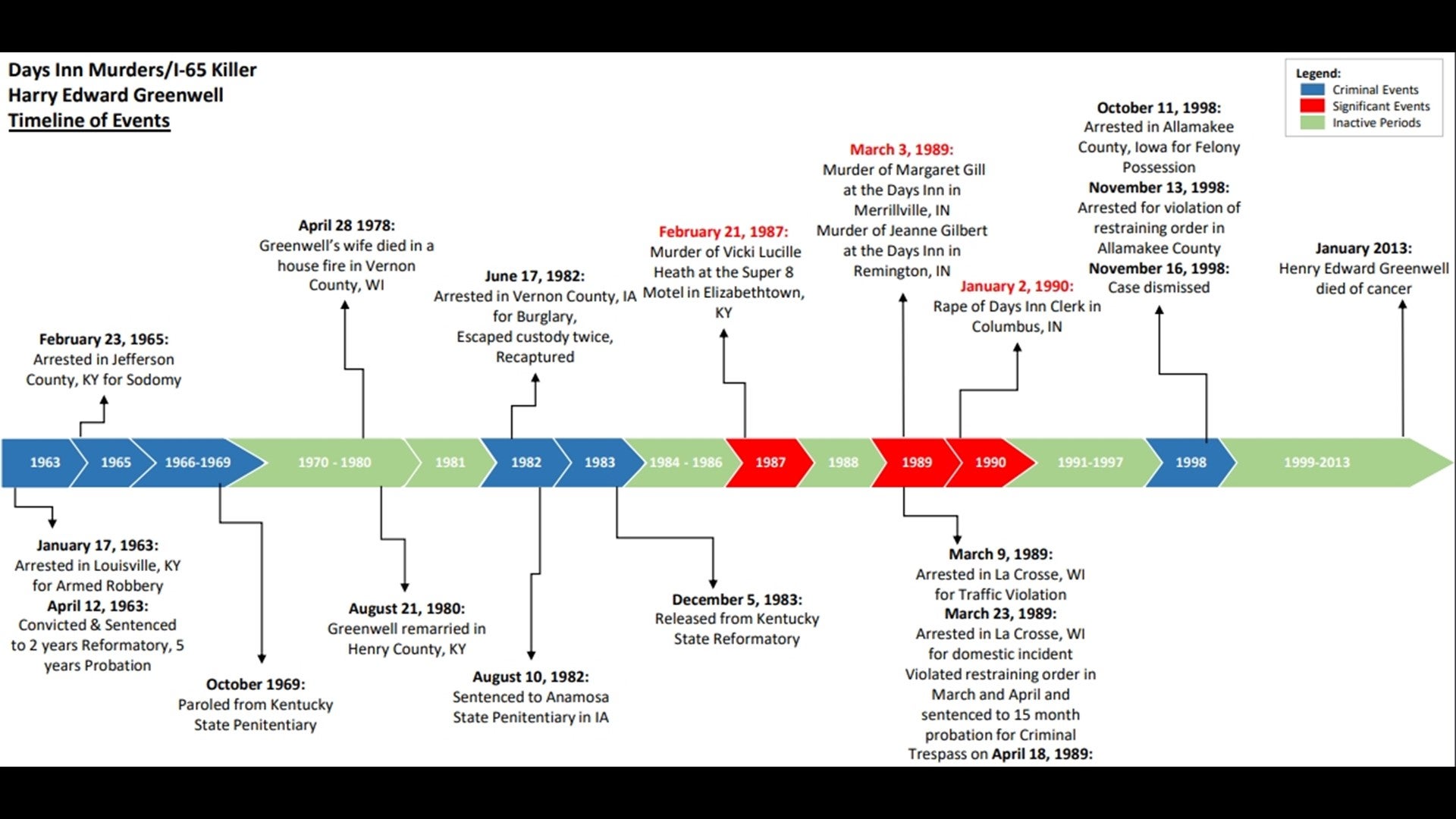Wife of I-65 serial killer reveals secret life that let him go undetected for decades: ‘I’m lucky to be alive’
EXCLUSIVE: Julie Jenkins, 73, was married to Harry Edward Greenwell for nearly 20 years until his death in 2013. Nine years later, she shares her shock at the news that Greenwell was behind the murders of three women in the 1980s – and her fear there are more victims than currently known – with Sheila Flynn

The wife of alleged I-65 serial killer Harry Edward Greenwell feels lucky to be alive, she exclusively told The Independent on Wednesday.
Julie Jenkins, 73, was married to Greenwell for nearly 20 years – and totally blindsided by the multi-agency press conference on Tuesday naming her husband, who died in 2013, as the killer of at least three women along the Kentucky-Indiana border in the late 1980s.
“One thing that’s going through my mind is that, I guess, I’m lucky to be alive,” Ms Jenkins, a grandmother now living in Minnesota, tells The Independent, adding that she’d previously been in a relationship with a man who was “abusive and almost killed me, and then [Greenwell] decided he would kill other people. That’s horrible.”
She says she is feeling “pretty dazed”.
“I keep thinking about our life together, and he was ... kind, he was caring. He did have a temper [but] that’s not unusual. I don’t think you kill people because you’re mad at them – not ... strangers. I don’t know what to think about much of it, other than that I feel horrible for the families that dealt with that for so many years – and I know there’s nothing I can do.
“I’m sorry. I had no idea.”
When asked about authorities’ suspicion her husband could have more victims, Ms Jenkins said: “It’s certainly a possibility. When you know what you do about serial killers, they generally don’t just stop – so I hope, no, I pray, that there aren’t going to be more victims that he’s linked to. But I fear there’s a real possibility.”
She adds: “I’m sorry for those people, as well – it makes me not trust my judgement.”
According to authorities, Greenwell – who was 68 when he died – was identified through genealogical investigation in all three deaths along the Indiana-Kentucky border.
“This technique involves uploading a crime scene DNA profile to one or more genetic genealogy databases in an attempt to identify a criminal offender’s genetic relatives and locate the offender within their family tree,” Indiana State Police said in a Tuesday release. “Utilizing this process, a match was made to Greenwell with a close family member. Through this match it was determined that the probability of Greenwell being the person responsible for the attacks was more than 99.99 per cent.”

The first woman known to be a victim of the I-65 killer was Vicki Heath, a 41-year-old mother of two who had recently become engaged before she was found dead beside the trash cans behind the Super 8 Motel in Elizabethtown, Kentucky, on 21 February 1987. She had been assaulted and shot twice in the head with a 38-calibre pistol.
The killer’s second and third victims were both slain on the same day: 3 March 1989.
Mary “Peggy” Gill, 24, a night auditor at a Days Inn motel in Merrillville, Indiana, was found dead in the building’s parking lot by a passing motorist. Jeanne Gilbert, 34, a mother of two who also worked as a part-time auditor at the Remington Days Inn, was also fatally shot with the same .22-calibre gun. The attacker had robbed both premises, making off with $426 in total.
A fourth woman working the night shift at a Days Inn motel in Columbus, Indiana, was sexually assaulted and stabbed in 1990 but managed to escape the scene. That woman, named only as Jane Doe, gave police a composite sketch, describing a man with greasy grey hair, a lazy green eye and a beard.
That sketch was the only clue for decades until DNA evidence linked Greenwell to the crimes.

When Greenwell died in 2013, his obituary gave no inkling of his alleged sinister past. It described him as a family man, a farmer, a do-gooder and a generous soul after he died in Iowa following a battle with cancer – writing he’d had “many friends who loved his straight-up attitude, and his willingness to help anyone”.
“His spirit will live on in many by good deeds he offered,” it continued – years before he was named as a serial killer.
Born in Louisville and one of more than a half-dozen siblings – several of whom have also passed away – Greenwell worked for the Canadian Pacific Railroad “providing public safety for 30 years” before retiring in 2010, the obituary read.
“Harry enjoyed organic gardening, selling his organic produce at the local Farmers Market, traveling, reading, wordsmithing, avid college sports fan, and selecting winning thoroughbred horses.”
At the time of his death, he was married to Ms Jenkins, who had three adult children of her own; Greenwell had his own son and daughter in addition to living siblings, nieces, a nephew, great-nephews and a great-niece.
“He loved to garden; he spent hours in his garden,” Ms Jenkins tells The Independent. “And he gathered everything and took it up to New Albin [Iowa] on certain days and sold it to people – and I always figured that his biggest reason of taking it up to the famers’ market was to visit with everybody that came there.”
She says “he sold everything that he grew ... tomatoes, onions, carrots, beets, squash”.
Before his 2013 death, she says, they lived in a three-bedroom farmhouse outside an Iowa town of about 300 people – and the home looked out onto a state highway.
Ms Jenkins says she had been contacted by an FBI agent earlier this year about Greenwell – who’d told her he had previously served time for robbery. She says she was completely flabbergasted by any suggestion he’d been involved in the murders of women.
“I couldn’t imagine this of Harry,” she tells The Independent. “And I said, ‘You know, he’s been dead for so long already. What would be the point now?’” in dredging up old cases.
“And he said ... ‘Don’t you think the families have a right to know?’ And absolutely they do. I wasn’t even thinking of them at the time. I can’t imagine what they’ve gone through all these years, which is horrible in itself.”
She says she told the FBI where to find Greenwell’s biological son; the alleged serial killer had been married twice previously, adopting one wife’s daughter and fathering a son with the other.
His first wife died in a house fire before Ms Jenkins met him at a Minnesota bar.
“I was very suspicious at first, coming from an abusive relationship – but he assured me that [the death of his ex-wife] was not the case,” Ms Jenkins says. “And of course I believed him; I guess I still do.
“He was off working at a railroad, I think it was over in Wisconsin ... when it happened. She was in Wisconsin, too, but they were across the state from each other, from what I remember. I do believe it was accidental or negligence on her part.”
She had no reason, she says, to be wary of Greenwell at all; he was supportive through her battle with breast cancer and loving to her family.
Despite his criminal history, she says: “He just told me it existed and, you know, I thought it was okay ... people change – and so you just give people a second chance, and okay, robbery is not cool, but he paid his time.”

Greenwell, who was four years older than his third wife, seemed penitent as he was dying from lung cancer, she says – though she had no idea about what, exactly.
When he was in hospice, “he asked for a priest and a priest came”, says Ms Jenkins who, unlike her husband, is not Catholic. “I presumed it was for confession, but I doubt that he confessed this.”
She says: “I just assumed that the priest would be obligated to tell somebody he did this, if he did do this”, though Catholic priests are forbidden from sharing anything told to them during the sacrosanct sacrament of confession.
”My other thought [since learning of the serial killing allegations] was: If he didn’t confess, what was the point of confessing to anything else? Because that would have trumped anything,” Ms Jenkins says.
Ms Jenkins says that, after her initial contact with the FBI, she heard no more about her late husband’s alleged crimes until this week’s press conference.
“My son, actually, was aware of it first,” she tells The Independent. “He called me home from work and opened it up for me to watch the news conference, and I just feel horrible for those poor families that lost their mothers, their sisters, their children.
“Had I known anything, if I’d had any inkling, I certainly would not have been silent about it, but I didn’t.”

She adds: “It’s terrifying, and my children feel the same way. I mean, I left them alone with him when I was at work ... I live with my son and his family, and I have a grandchild who Harry thought was pretty special. They had a connection.”
She says that her 17-year-old granddaughter is “pretty devastated about it”.
“I told her last night,” Ms Jenkins tells The Independent. “With the internet, you can’t protect children anymore – so I figured she needed to hear it from me, rather than anyone else.”
Friends and family have been suitably shocked, she adds, though she has not yet spoken to Greenwell’s son, siblings or extended family.
“I expect that I will reach out and discuss it with them as much as they would want to, but yesterday I just didn’t have the energy,” she says.
In addition to reeling from the news, her foremost thoughts are with the families of the victims, she adds.
“It was kind of a sucker-punch when the FBI contacted me,” she says. “I thought, ‘Well, this can’t be real. This can’t be’ ... but then that [agent] mentioned family has a right to know – and I thought, ‘Absolutely they do.’ So I did what I could to point them in the right direction, and then I didn’t hear anymore – and then I almost forgot about it.
“I just want the families of the victims to know how sorry I am for what they’ve gone through. If there had been anything I would’ve known to alter the situation before this, I certainly would’ve done it.
“I don’t know that they’d want to reach out to me for anything; I certainly would not be averse to that happening.”
Of the avid, kind gardener she thought she’d married, she says: “I guess you think you know somebody. I thought I knew him, but apparently I didn’t know him very well.”
Bookmark popover
Removed from bookmarks